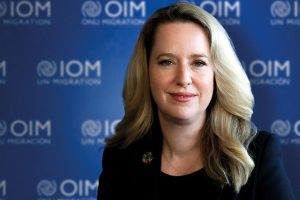Why the world needs to rethink migration
Migration should be regarded as a solution to economic problems and the effects of climate change and not as population crisis, according to the head of the UN’s migration agency IOM.
 Director General of the International Organisation for Migration (IOM) Amy Pope said migration had the potential to drive growth and revitalise communities.
Director General of the International Organisation for Migration (IOM) Amy Pope said migration had the potential to drive growth and revitalise communities.
Speaking at the 79th United Nations General Assembly, Ms Pope said global leaders must establish legal pathways for migration and reframe the narrative, moving away from depictions of perpetual crises to positioning cross-border movement as a strategic solution to economic and social challenges.
During the Devex panel event titled ‘From crisis to opportunity: Shaping pathways beyond humanitarian aid’, Ms Pope talked about the escalating displacement crisis, citing 10 million people uprooted in Sudan and 7.5 million in the Democratic Republic of Congo, with climate change further worsening the situation.
“We have people who are moving all the time because of conflict, but increasingly we have people who are moving as a result of poverty and as a result of the impacts of climate change,” Ms Pope said.
She called for immediate global action to prevent further displacement. “And that’s the place where I think we really need to focus,” she said.
Ms Pope’s comments were part of her deliberate and orchestrated campaign to reshape the global conversation around migration.
Speaking earlier this year, at the ‘Facilitating Regular Pathways’ conference in New York, Ms Pope said Mass migration was here to stay and the world needs to regularise, make safe and reap the economic benefits of the movement of people.
“More people are fleeing war or fleeing violence. More people are fleeing economic hardship, or lack of opportunity. More people are fleeing the impacts of climate change, or food scarcity. And increasingly, people are fleeing a combination of all of the above,” Ms. Pope said.
She said migrants were particularly vulnerable to exploitation, violence, abuse and discrimination, she continued. This is especially the case in the context of irregular migration, with desperate people making long, dangerous journeys in the search for a better future.
At the same time, Ms Pope said, migration is one of the most crucial drivers of economic resilience, growth and prosperity.
“Migration is even recognised in the 2030 Agenda for Sustainable Development as a catalyst for a more just and equitable future for all people and the planet,” Ms Pope said.
She said orderly migration could deliver economic benefits.
“Obviously, it brings benefits in terms of economic prosperity. But it also leads to the exchange of skills, to the strengthening of the labour force, to investment and cultural diversity. It also brings some really good food, if we’re honest,” Ms Pope said.
She said it was clear migrants improve their lives through migrating.
And the money they send home increased by a staggering 650 per cent during the period from 2000 to 2022, rising from $US128 billion to $US831 billion.
Most of the remittances, $647 billion, were sent to low and middle-income countries, constituting a significant portion of their Gross Domestic Product (GDP) and surpassing foreign direct investment.
Ms Pope also called for investments in migration, saying any talk about investment must also include investment in people and in migration to protect the human rights and dignity of migrants.
“And the way to do that is by building safe and regular pathways for migration ensuring that they are able to access essential services and are not fodder for exploitation in the countries where they’re going to work,” she said.












